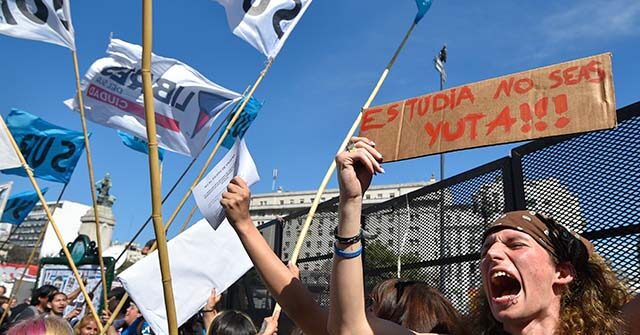Argentine lawmakers voted on Wednesday to uphold President Javier Milei’s veto of a controversial university financing bill that the government denounced as jeopardizing its fiscal balance and economic recovery goals.
Milei’s veto was upheld after the motion failed to obtain the two-thirds of votes required to overturn it in the lower house, with 85 yays and 159 nays. Milei’s party, Liberty Advances, does not have a majority in Congress. Argentine leftists responded to the president’s veto with violent protests, calling to strike and take over universities.
The bill, initially passed by opposition lawmakers in both chambers of the Argentine Congress in September, sought to dramatically increase funding for Argentina’s 60 public universities, and included provisions to update the universities’ budgets on a monthly basis based on inflation, retroactive to December 1, 2023.
The proposal appeared to be a gesture of defiance against Milei, who took office on December 13 promising a series of “shock therapy” economic measures to overturn years of difficulties that dramatically worsened during the administration of socialist former President Alberto Fernández (2019-2023). Milei’s policies have resulted in a reduction of inflation in Argentina, going from 25 percent in December to four percent in August. Milei has fiercely maintained that his “zero deficit” goal is non-negotiable.
Milei formally vetoed the bill last week. The Argentine president explained in an official statement that the “irresponsible” proposal did not specify where the resources to increase the universities’ budgets would come from. The statement further asserted that Milei will veto any bill that infringes on fiscal balance.
“It is time for legislators to understand that they can no longer engage in demagogic populism with the resources of those who pay taxes, and begin to act with the responsibility that this historic moment demands,” the statement read, adding, “the right place to discuss the financing of universities is the debate of the National Budget 2025.”
The Argentine presidency accused opposition politicians such as former President Cristina Fernández de Kirchner and former Economy Minister Sergio Massa of uniting with the aim of “obstructing the President’s economic plan.”
“This administration will not give in to media spectacle, irresponsible bills, or the manipulation of noble causes for partisan purposes. The Government’s goal is clear: to put an end to the impoverishing model of the last 100 years and make Argentina great again,” the statement concluded.
Argentine law states that, in the event of a presidential veto, the bill goes back to Congress, which may accept the veto or overturn it with two-thirds of the votes in both chambers. If the veto is upheld, the bill may not be dealt with again for the remainder of that year’s legislative session period.
Leftist students and organizations violently protested outside of Congress while the veto debate was underway. Franco Antunez, a pro-Milei libertarian activist and streamer known as “Fran Fijap,” was assaulted by the rioters.
Antunez told the news channel Todo Noticias that the protesters beat him and stole his work phone before he sought refuge at a nearby food vendor until police safely escorted him away.
“I arrived at the premises and everyone started chasing me, one of them tried to hit me and I started to run,” Antunez said. “At one point they closed in on me a few meters from the premises, they threw me to the ground and a boy covered me with a bike.”
“They broke things, they started hitting the shutters, nothing, that’s what happened. The boys from the shop looked after me and kept me safe,” he continued.
Milei visited the restaurant that sheltered Antunez on Thursday noon.
The head of the Argentine Chamber of Deputies, Martín Menem, described the now-vetoed bill as “delirium” to the news channel La Nación and accused the lawmakers who supported the bill of hiding behind the subject of education to “hand over a defeat to Milei’s government.”
“A battle was won. We came to change Argentina seriously. There have been 122 years of uninterrupted deficit. We always spent more than what we could,” Menem said, before describing the protests outside Congress as “vile maneuvers to hide behind the young people. There are many who demonstrated who are sorry, but others do not study.”
“There are young people who ask you to put money where they don’t even know how much. They don’t know how the university situation is, but they force the government to do something when they don’t do it,” he continued.
Christian K. Caruzo is a Venezuelan writer and documents life under socialism. You can follow him on Twitter here.
Read the full article here
